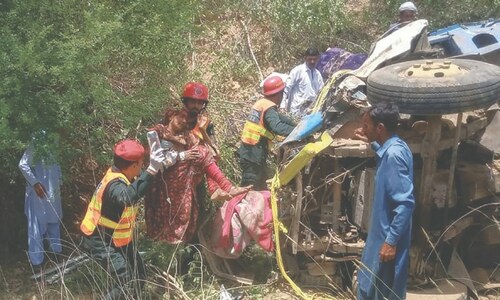UNITED NATIONS, July 12: Malala Yousufzai, the teenaged activist shot at by the Taliban in Swat in October last year, celebrated her 16th birthday on Friday with an impassioned appeal to world leaders not to relent in the fight against “illiteracy, poverty and terrorism”.
“I am fighting for women’s rights because they suffer the most during conflicts,” said the girl whose name has become synonymous with courage and fortitude.
A passionate campaigner for female education, Malala was addressing over 1,000 students from 100 countries at an especially convened youth assembly at the world body.
The United Nations had designated July 12 as Malala Day.
Wrapped in a shawl gifted to her by Benazir Bhutto, Malala told the United Nations General Assembly that the Taliban’s attack had changed nothing in her life, except that “weakness, fear and hopelessness died”.
“The extremists were, and they are, afraid of books and pens,” Malala said. “They are afraid of women.”
She urged politicians to take urgent action to ensure that every child went to school.
“Let us pick up our books and pens,” the teenager said. “They are our most powerful weapons. One child, one teacher, one pen and one book can change the world. Education is the only solution. Education first.”
Agencies add: There were cheers, standing ovation and a round of “Happy Birthday” from a responsive audience as soon as Malala took to the podium. But she said: “Malala Day is not my day. Today is the day of every woman, every boy and every girl who have raised their voice for their rights.”
In the address, she called herself just one of thousands of victims of the Taliban. She said the bullet that entered the left side of her forehead last October, which the extremists thought would silence her, had not dimmed her ambitions to promote peace, education and prosperity.
Her head was covered in a scarf and her face displayed little sign of injury. “I’m not against anyone, neither am I here to speak in terms of personal revenge against the Taliban, or any other terrorist group,” the schoolgirl said in a tone and tenor that belied her years.
“I’m here to speak about the right of education for every child,” she asserted. “I want education for the sons and daughters of all the Taliban and all the terrorists and extremists.”
Malala went on to grab the audience’s attention with poignant remarks. “I do not even hate the Talib who shot me. Even if there is a gun in my hands and he stands in front of me. I would not shoot him.”
Extremists kill students, especially girls, and destroy schools because they are afraid of the power of education and the power of women, she added.
She called upon all communities to be tolerant and reject prejudice based on caste, creed, sect, religion or gender.
‘MOST COURAGEOUS GIRL’: Former British prime minister Gordon Brown, who helped organise the Youth Assembly in his capacity as the UN’s special envoy for global education, said Malala Yousufzai was doing exactly what the Taliban did not want her to do, calling her “the most courageous girl in the world”.
Secretary-General Ban Ki-moon denounced terrorist attacks on students saying: “No child should have to die for going to school.”
Unesco and Save the Children released a special report entitled “Children Battling To Go To School” as a curtain raiser to Malala’s speech.
According to the report, the number of primary school age children not getting an education has fallen slowly from 60 million in 2008 to 57 million in 2011, but during that period the percentage of youngsters in conflict-affected countries who weren’t at primary school rose from 42 per cent to 50.
The report found that 95 per cent of the 28.5 million children in conflict-ridden areas who aren’t getting a primary school education live in low and lower-middle income countries _ 44 per cent in sub-Saharan Africa, 19 per cent in south and west Asia, and 14 per cent in Arab states.
Girls make up 55 per cent of the total and are often the victims of rape and other sexual violence that accompanies armed conflicts, Unesco said.





















































Dear visitor, the comments section is undergoing an overhaul and will return soon.